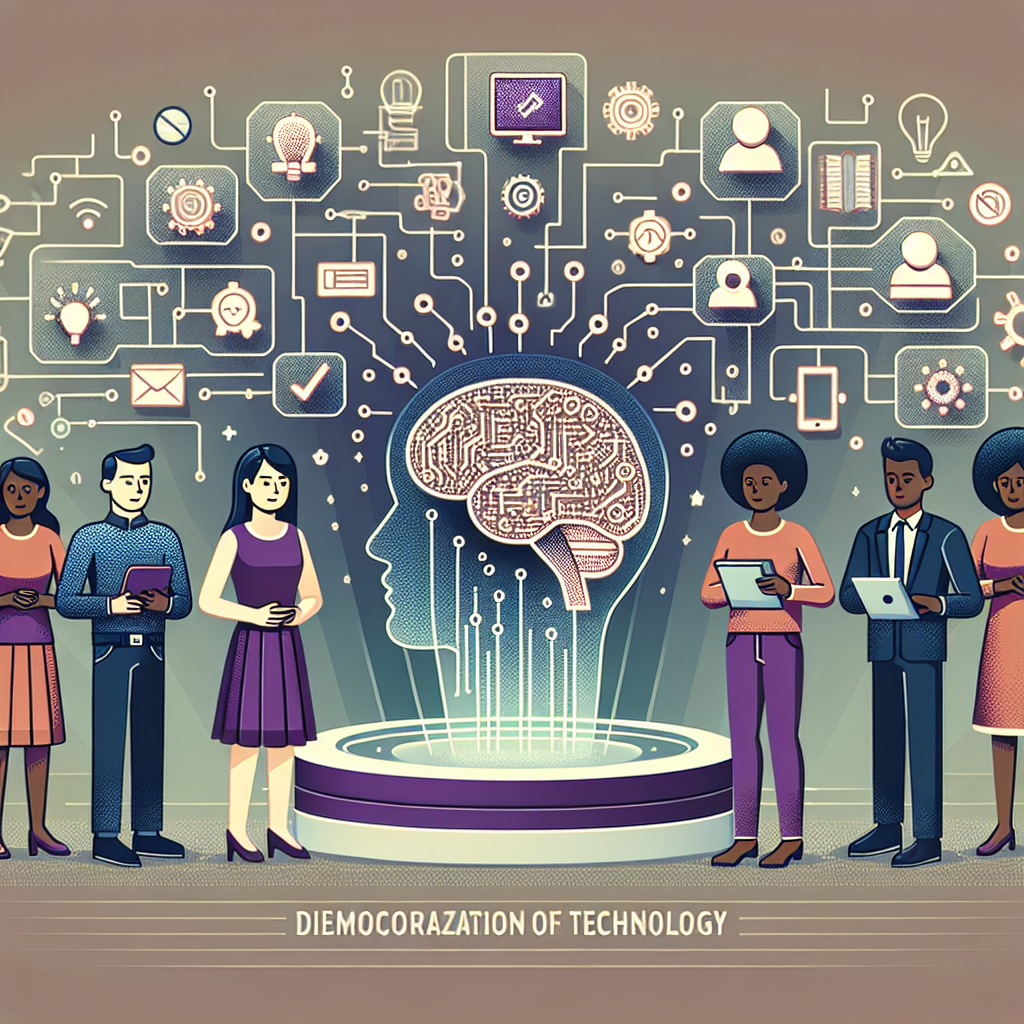Artificial Intelligence (AI) has been a buzzword in the tech industry for years, but it is now becoming more accessible to everyone. The democratization of technology has made AI more user-friendly and available to a wider audience, not just tech experts and data scientists. This shift has the potential to revolutionize the way we work, play, and live our lives.
AI for Everyone is a concept that aims to make AI technology more inclusive and easy to use for people of all skill levels. Whether you are a small business owner looking to improve your customer service, a student wanting to enhance your academic performance, or a stay-at-home parent seeking help with daily tasks, AI for Everyone can benefit you. This democratization of technology is empowering individuals and organizations to harness the power of AI in ways that were previously out of reach.
One of the key drivers of the democratization of AI is the development of user-friendly tools and platforms that make it easier for non-experts to implement AI solutions. Companies like Google, Microsoft, and IBM have all launched AI platforms that require little to no coding knowledge, making it possible for anyone to build and deploy AI models. These platforms offer pre-built models, drag-and-drop interfaces, and step-by-step guides that make it easy for users to get started with AI.
Another factor contributing to the democratization of AI is the increasing availability of AI education and training programs. Online courses, workshops, and boot camps are now widely available, offering people the opportunity to learn about AI and how to use it in their everyday lives. These programs cater to a range of skill levels, from beginners to advanced users, and cover topics such as machine learning, natural language processing, and computer vision.
The democratization of AI also extends to the development of AI-powered products and services that are designed to meet the needs of a diverse range of users. Virtual assistants like Siri, Alexa, and Google Assistant are examples of AI technologies that have become mainstream and are used by millions of people around the world. These virtual assistants can help users with a variety of tasks, from setting reminders and making appointments to playing music and answering questions.
AI for Everyone has the potential to revolutionize industries such as healthcare, finance, and education. In healthcare, AI-powered diagnostic tools can help doctors identify diseases and conditions more accurately and quickly. In finance, AI algorithms can analyze market trends and make investment decisions with greater precision. In education, AI-powered tutoring systems can provide personalized learning experiences for students, helping them to reach their full potential.
Despite the many benefits of AI for Everyone, there are also challenges and concerns that need to be addressed. One of the main concerns is the potential for bias in AI algorithms, which can lead to discriminatory outcomes. For example, AI algorithms used in hiring processes may unintentionally favor certain demographics over others, leading to inequalities in the workforce. Addressing bias in AI requires careful testing, monitoring, and oversight to ensure that algorithms are fair and unbiased.
Another challenge is the ethical implications of AI, particularly in areas such as privacy and security. As AI technologies become more advanced, they have the potential to collect and analyze vast amounts of personal data, raising concerns about data privacy and security. Companies and governments must take steps to protect user data and ensure that AI systems are used ethically and responsibly.
FAQs:
Q: What is AI for Everyone?
A: AI for Everyone is a concept that aims to make AI technology more accessible and user-friendly for people of all skill levels. It includes user-friendly tools, education programs, and AI-powered products and services that cater to a diverse range of users.
Q: How can I get started with AI?
A: There are many online courses, workshops, and boot camps available that can help you learn about AI and how to use it in your everyday life. Companies like Google, Microsoft, and IBM also offer AI platforms with pre-built models and drag-and-drop interfaces that make it easy to get started with AI.
Q: What are some examples of AI-powered products and services?
A: Virtual assistants like Siri, Alexa, and Google Assistant are examples of AI-powered products that are used by millions of people around the world. These virtual assistants can help with a variety of tasks, from setting reminders and making appointments to playing music and answering questions.
Q: What are some challenges of AI for Everyone?
A: Some of the challenges of AI for Everyone include bias in AI algorithms, ethical implications of AI, and concerns about data privacy and security. Companies and governments must take steps to address these challenges and ensure that AI systems are used ethically and responsibly.

